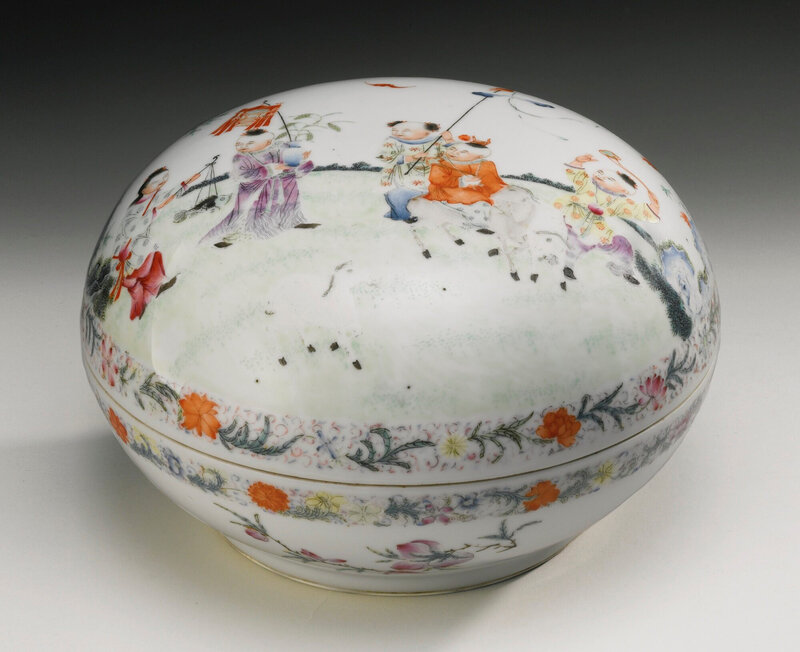Sotheby's. Fine Chinese Ceramics & Works of Art, New York, 11 september 2012
29 janvier 2020
A famille-rose circular box and cover, Republican period (1912-1949)
Lot 396. A famille-rose circular box and cover, Republican period (1912-1949). Diameter 8 3/4 in. 22.2 cm. Estimate 8,000 — 12,000 USD. Lot sold 8,750 USD. Photo Sotheby's
the cover painted with five boys in a mock procession, one riding a ram and holding a ruyi, the others all holding objects symbolic of scholarly success and good fortune, with three bats hovering overhead, the rim decorated with a floral scroll, repeated on the rim of the box, above evenly spaced leafy branches of the 'Three Abundances', the base centered with a iron-red mark reading linzhi chengxiang (the qilin's footprints foretell good fortune) (2).
Provenance: Acquired in China in the 1960s and thence by descent.
Note: While the decoration on this box may appear to depict children at play, it is in fact filled with symbolic meaning. The five boys represent the sons of Dou Yujun, all of whom achieved exceptional success and were known as the 'five dragons'. Two of the boys hold ruyi scepters. The word ruyi means 'as you desire' and represents the wish that all your desires come true. One boy holds a spear, called a ji, in Chinese, which is a homophone for 'grade', referring to the grades in the imperial examinations. A long fluttering ribbon secures the chime to the spear. The word for chime is qing, which sounds the same as the word for celebration, while the ribbon, dai, is a homophone for generations. Together these elements represent the wish that generations of the family celebrate success in the imperial examinations. Another boy holds a vase with a stalk of grain and a lantern. The word for grain is sui, a homophone for 'year', while the word for vase is ping, which sound the same as 'peace'. This forms the rebus suisui ping'an (peace year after year). The lantern, deng, is a pun on the word 'ascend', representing the desire for peaceful ascendency in one's official career. The last boy also holds a lantern in the shape of a fish. The word for fish, yu, is a homophone for the word 'abundance'. The three rams forms the rebus sanyang kaitai, a portend to a bright future, while the bats, fu, represent blessings. The branches painted on the box represent the 'Three Abundances'. The peaches represent an abundance of longevity, the finger citrons represent an abundance of blessings, and the pomegranates, an abundance of sons. In fact the mark on the bottom, linzhi chengxiang, was an ancient greeting used to wish couples the birth of a son, and often found on pieces decorated with boys and qilin.
Publicité
Publicité
Commentaires

/https%3A%2F%2Fprofilepics.canalblog.com%2Fprofilepics%2F1%2F0%2F100183.jpg)
/https%3A%2F%2Fstorage.canalblog.com%2F03%2F02%2F119589%2F96711876_o.jpg)
/https%3A%2F%2Fstorage.canalblog.com%2F11%2F31%2F119589%2F94773502_o.jpg)
/https%3A%2F%2Fstorage.canalblog.com%2F20%2F83%2F119589%2F94772815_o.jpg)
/https%3A%2F%2Fstorage.canalblog.com%2F26%2F72%2F119589%2F75604929_o.jpg)
/https%3A%2F%2Fstorage.canalblog.com%2F59%2F60%2F119589%2F26458628_o.jpg)




/http%3A%2F%2Fstorage.canalblog.com%2F17%2F73%2F119589%2F128475860_o.jpg)
/http%3A%2F%2Fstorage.canalblog.com%2F19%2F06%2F119589%2F127776680_o.jpg)
/http%3A%2F%2Fstorage.canalblog.com%2F70%2F40%2F119589%2F126469805_o.jpg)
/http%3A%2F%2Fstorage.canalblog.com%2F03%2F76%2F119589%2F126152956_o.jpg)